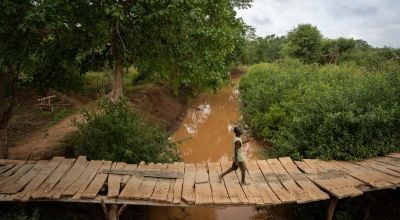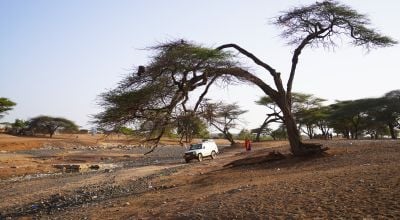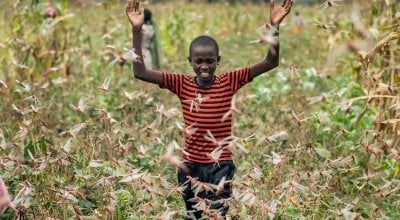
Read our 2023 annual report

Knowledge Hub
Praying for rain in Kenya
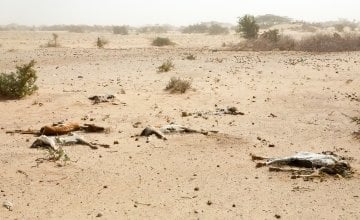
Concern communications officer, Catriona Loughran, visited drought-afflicted northern Kenya in February of this year. Now she reflects on her trip as the communities she visited continue to suffer the devestating consequences of the arid climate.
Kenya was in the grip of a severe drought when I visited Concern’s programmes in Marsabit back in February. Almost everyone I spoke to was praying for the rains to come. They had been driven to despair after months of no rainfall. Animal carcasses lay scattered on the ground as we travelled through the region. For nomadic pastoralist communities in northern Kenya, each carcass represented another cruel blow to a family’s future. Their livelihoods were wasting away before their eyes. As the water dried up, so too did their income. Many were going without food for days at a time.
Weakened by hunger
Atho Shama was one of the many people I met who were praying for rain. Our paths crossed as he approached Concern’s outreach centre in Basbelesa. He was carrying his five month old baby in his arms as wife Iyesa, visibly weakened by hunger, struggled to keep pace with him. In all his 78 years, Atho had never experienced a drought as long and ferocious as this one.
Iyesa was complaining of headaches and had a fever. She was struggling to feed their baby boy, and had walked to the nutrition centre in the hope of getting medicine and nutritional supplies. Her voice barely above a whisper, she told me, “I feel weak and I can’t breastfeed my baby because I have no milk or food”.
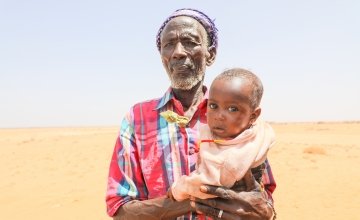
Going days without food
Atho told me they would regularly go for long periods without food, up to three days at a time. He was struggling to cope with no longer being able to provide for his family. “I feel bad. I do not feel like a husband any longer because I cannot look after my family”, he said, adding, “There is nothing we can do but pray for rain”.
Vulnerable people who are most at risk
Iyesa was not the only mother I met who was struggling to cope with a lack of food. In food crises such as this one, it is always the vulnerable people who are at most at risk from hunger. Pregnant and lactating women and their young infants are amongst those considered most vulnerable.
Nasino Asuran, a single parent, hadn’t eaten in three days except for a small cup of goat’s milk she shared with her two children, an evening ritual to help keep the hunger pains at bay while they slept. To make matters worse, Nasino was six months pregnant when we spoke, and had barely enough energy to get out of bed in the morning.
“My children are constantly crying because they are hungry”.
The drought had ravaged Nasino’s village and emaciated her livestock. The food from last year’s harvest was gone and there were no jobs in the community. Feeding her young family had become almost impossible. She told me “I have no income to buy food. I have no work to make money and my children are crying constantly because they are hungry. I am also hungry and I feel weak, which makes it hard to face the day".
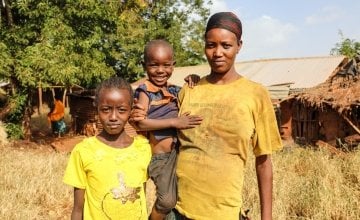
The struggle to find water
En route to the village of Yaa Algana, we encountered 51 year-old Budha Tura, along with her neighbour Enow Wanyo and his herd of goats. Budha was scooping cupfuls of water into a jerry can from a muddy pool that had been left over from a small rain shower. The water looked filthy and potentially harmful, but Budha and her family were desperate.
With no proper rainfall in the area since the previous October, her only other option would have been to travel twelve hours to the nearest water facility. “My donkeys are too weak to make the journey. It would not be economic for me to walk twelve hours with just one jerry can of water, but it is all I can carry without the donkeys so this is my best option”, Budha said.
With her donkey unable to travel, Budha relied on word of mouth about watering holes popping up along the deserted plains after small bouts of rain. With a stroke of luck, she heard about this particular watering hole from Enow, who made the hour long journey with her.
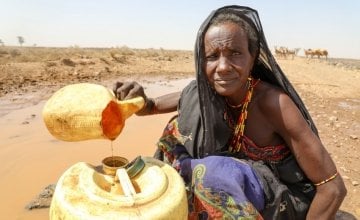
Drinking unsafe water to survive
The pool of water looked gloopy and warm and it was drying up quickly as another pastoralist arrived with his animals. “Word spreads fast”, said Enow. “It’s a constant competition between us and the animals. They have to drink too, otherwise they die”, he continued.
Enow confided in me that he often goes without water so his animals can drink first. “If we don’t have goats to sell we have nothing”, he said, before adding, “we know this water might not be safe, as animals are urinating in it, but what can we do? I have never seen the drought as bad as this, we are very worried about the future”.
Thankfully, Concern staff were on hand to provide the two neighbours with life-saving aquatabs to help sterilise the water and make it safe to drink. “I am happy that I have been given them, especially now since the water I have collected here is dirty”, Buddha said. But clean water was not her only worry.
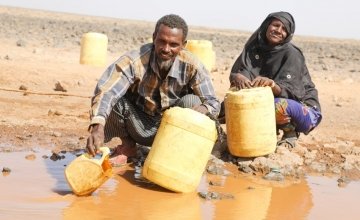
“I feel death staring at me every day”
Budha hadn’t eaten since the previous day, and like so many others, had often gone without food for up to three days so that her children could eat. “My stomach hurts from the hunger pains. I feel so bad and have no strength. But I have to keep going for my children”, she told me.
She too had been praying for rain, but she was starting to lose hope. She said “I am losing my strength every day. The situation is getting much worse than I expected. We need all the help we can to get us through this period because we are facing the dark. I feel death is staring at me every day”.
Poor seasonal rains leave millions still at risk
That was February. In the end, the prayers for rain were largely in vain. The seasonal rains in Marsabit typically fall between March and May. But this year they were delayed and when they finally arrived, they were paltry and poorly distributed, offering little respite to the people who needed them so desperately.
Now the people of Marsabit are facing into a long dry period between July and September. Their situation remains precarious. And across the country, some 2.6 million people are severely food insecure and at risk of starving.
The government is doing what it can to provide relief, but resources are stretched to their limits. During my time there in February the drought was declared a national emergency. For a crisis of this scale, the government needs support to reach everyone who is affected.
Concern is helping
We have launched an emergency response to support communities in Kenya who have been affected by the drought. We are providing pregnant and lactating mothers like Iyesa and Nasino with nutritional support and treating children who are malnourished. And we are distributing weekly cash transfers to families so that they can buy food or other urgent supplies.
You can help
With your help, we can reach even more families who have lost their livelihoods and who are at risk of starvation. Please donate today.
In depth



